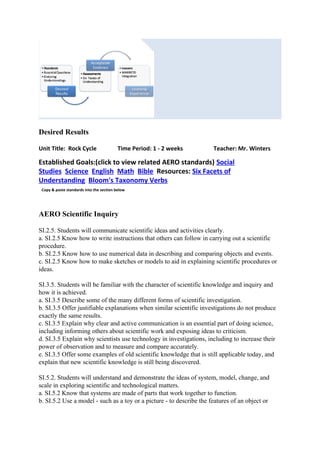
Rock Cycle Ideal For 5 7 Grade
- 1. Desired Results Unit Title: Rock Cycle Time Period: 1 - 2 weeks Teacher: Mr. Winters Established Goals:(click to view related AERO standards) Social Studies Science English Math Bible Resources: Six Facets of Understanding Bloom's Taxonomy Verbs Copy & paste standards into the section below AERO Scientific Inquiry SI.2.5. Students will communicate scientific ideas and activities clearly. a. SI.2.5 Know how to write instructions that others can follow in carrying out a scientific procedure. b. SI.2.5 Know how to use numerical data in describing and comparing objects and events. c. SI.2.5 Know how to make sketches or models to aid in explaining scientific procedures or ideas. SI.3.5. Students will be familiar with the character of scientific knowledge and inquiry and how it is achieved. a. SI.3.5 Describe some of the many different forms of scientific investigation. b. SI.3.5 Offer justifiable explanations when similar scientific investigations do not produce exactly the same results. c. SI.3.5 Explain why clear and active communication is an essential part of doing science, including informing others about scientific work and exposing ideas to criticism. d. SI.3.5 Explain why scientists use technology in investigations, including to increase their power of observation and to measure and compare accurately. e. SI.3.5 Offer some examples of old scientific knowledge that is still applicable today, and explain that new scientific knowledge is still being discovered. SI.5.2. Students will understand and demonstrate the ideas of system, model, change, and scale in exploring scientific and technological matters. a. SI.5.2 Know that systems are made of parts that work together to function. b. SI.5.2 Use a model - such as a toy or a picture - to describe the features of an object or
- 2. system. Physical Setting S.7.5. Students will understand how key features of the earth influence climate, weather, and the water cycle. c. PhS.7.5 Describe the steps of the water cycle. PhS.8.5. Students will understand scientific theories of how the earth's surface is formed and how those theories developed. a. PhS.8.5 Describe how wind, and water in various forms, shape the Earth's surface, including the processes of erosion and deposit. b. PhS.8.5 Describe the composition of rocks and the rock cycle. c. PhS.8.5 Explain the effects of earthquakes and volcanic eruptions. d. PhS.8.5 Understand that the rate of change of the earth's surface can range from abrupt (such as earthquakes and volcanic eruptions), to very slow (such as uplift and wearing down of mountains). e. PhS.8.5 Understand how fossils are formed PhS.9.5. Students will know and understand scientific theories of the nature of matter and how those theories developed. a. PhS.9.5 Describe and explain how temperature can change materials' properties and the effects of extreme heat. b. PhS.9.5 Understand that materials are composed of parts that are too small to be seen without magnification. d. PhS.9.5 Describe and explain how basic types of materials can be used to make many different materials, the properties of which might be different from those of the original materials. Enduring Understandings: 1. Universal phenomena such as the rock cycle lead to the development of theories of origin that are not universally agreed upon. 2. Development of scientific vocabulary and knowledge of concepts are necessary for effective communication in science. 3. The development of scientific tools and technology is directly related to many importan scientific discoveries. Essential Questions: 1. How is the understanding of rock formation related to scientific theories in earth science? 2. What universal truths are assumed when scientists proclaim the age of landforms? 3. How do the processes involved in rock formation affect the appearance and properties of rocks? 4. How do earth’s processes contribute to the formation and changes of rocks?
- 3. Students will know . . . • The Rock Cycle • Scientific Vocabulary related to the rock cycle • Investigations and related technology • Story elements • Students will be able to . . . • Describe properties of minerals. • Explain how minerals are formed and used. • Collect information about minerals using observational skills. • Differentiate among different rocks. • Describe the relationship between rocks and minerals. • Explain how rocks form. • Identify examples of sedimentary, igneous, and metamorphic rocks. • Describe the processes involved in the rock cycle.
- 4. Acceptable Evidence Performance Tasks: Model of Final Project created by Mr. Winters Rock Story Final Assessment Instructions and Grading Rubric Invitation to Reading of Rock Stories Event Observations and asking questions § Grades taken on worksheets, workbook pages, quizzes, lab investigations sheets, and tests § Group and individual projects § Participation grades for labs and observations and discussions § Create and illustrate personified rock story Other Evidence: Rock Cycle Formative Assessment - A way to check for understanding does not have to be graded. Final Unit Test with answer key-
- 5. Learning Experience Biblical Integration W- Where are we going? H- Hook E- Equip R- Rethink E-2 Evaluate T- Tailor O- Organize Learning Activities & Resources: Lesson Plans for lessons 1 - 4 Inside Lesson 2 - Create a Sedimentary Rock (Investigation) - Paper cups, fine gravel or sand, liquid glue, paper towels. Rock properties investigation - Labeled rock samples, magnifying glass, vinegar Vocabulary work sheets - sample slide 11 Cornell Notes Pages - sample slide 9 • Note cards • Workbook • Books • Paper • Lab Materials (see textbook) • Computers for web quests and other publications
- 6. • Note cards for vocabulary • Journals for notes Biblical Integration & World View • How does the rock cycle and earth's processes relate to the Biblical account of creation in Genesis? • God is a God of order and we can use our understanding of earth's processes to draw conclusions about changes in earth's surface and how landforms were developed.